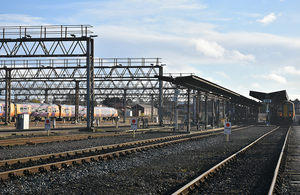Report 09/2020: Fatal accident at Tyseley depot
RAIB has today released its report into a fatal accident at Tyseley depot on 14 December 2019.

Photograph of Tyseley depot (the trains shown were not those involved in the accident)
Summary
At around 20:00 hrs on Saturday 14 December 2019, a train driver became trapped between two trains in the yard at Tyseley maintenance depot, Birmingham. The driver received fatal injuries as a result.
The driver became trapped because he was passing between two closely-spaced trains when one of the trains was moved towards the other as part of a coupling operation. The driver had not used a safe route when he was walking within the yard, and almost certainly did not expect that the trains would move as he passed between them. Another driver, who was attempting to couple the trains, was unaware that anyone else was close to them. He did not sound a warning prior to coupling because local instructions did not require this.
RAIB’s investigation identified that the depot operator, West Midlands Trains, had not adequately considered the risks faced by drivers on depots. The investigation also found that Tyseley depot is operating at or beyond its capacity at night and that West Midlands Trains’ management assurance processes had not promoted safe working practices.
Recommendations
RAIB has made two recommendations as a result of the investigation, both addressed to West Midlands Trains. The first recommendation is that West Midlands Trains ensures that effective assessments are carried out of the risks to those walking and working in depots, yards and sidings and that suitable measures are in place to control these risks. The second recommendation is that West Midlands Trains reviews its safety assurance processes to ensure that unsafe working practices within the company can be effectively identified and their causes addressed.
The investigation has also identified six learning points for the railway industry:
-
the first two learning points warn duty holders and railway staff of the dangers of being in close proximity to railway vehicles
-
the third learning point reminds duty holders that authorised walking routes must be made known to staff
-
the fourth learning point reminds duty holders of the importance of assessing the capacity of depots relative to the operational demands placed on them to ensure that they can be operated safely
-
the fifth learning point is that results from brake tests and other safety critical examinations are routinely checked and understood by competent staff
-
the sixth learning point covers the importance of screening staff members involved in accidents for the presence of drugs or alcohol in accordance with the relevant procedures.
Simon French, Chief Inspector of Rail Accidents said:
The death of any member of railway staff on duty is a tragedy. As we publish RAIB’s investigation report into the accident which took place at Tyseley depot in December last year, my thoughts are very much with the family of the train driver who died as a result.
This sad accident highlights how dangerous depots and sidings can be. When I started on the railway in 1982 one of the first things that was drummed into me was to take care around vehicles, and to only go under or between vehicles when you were quite sure they were not going to move. That is as true now as it was then. No matter how bad the weather, don’t be tempted to make a quick dash through a small gap. It could prove fatal.
In a depot like Tyseley, trains are maintained and serviced in readiness for their next duty. Train drivers are required as part of their normal work to take trains into depots for these activities to take place. They will also carry out the final preparation of trains and take them out of depots afterwards. We found that the department within the train operating company responsible for managing traincrew and the department responsible for the servicing and maintenance of trains were not working well together. This meant the company as a whole did not understand or sufficiently manage the risks posed to drivers who were working or walking in depots. The company was also not taking effective action to deal with unsafe actions in depots. Good safety management requires both an understanding of risk and spotting when things are not being done properly, and then doing something about it.
Notes to editors
- The sole purpose of RAIB investigations is to prevent future accidents and incidents and improve railway safety. RAIB does not establish blame, liability or carry out prosecutions.
- RAIB operates, as far as possible, in an open and transparent manner. While our investigations are completely independent of the railway industry, we do maintain close liaison with railway companies and if we discover matters that may affect the safety of the railway, we make sure that information about them is circulated to the right people as soon as possible, and certainly long before publication of our final report.
- For media enquiries, please call 01932 440015.
